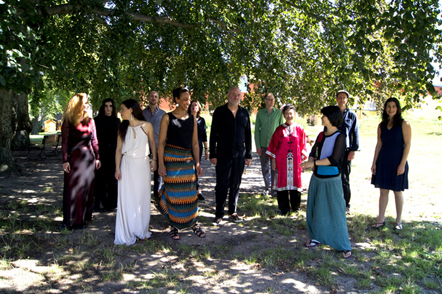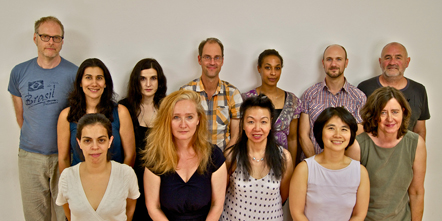


News

|
IYouWeBe – Take my Otherness
Eine konzertante Jazzoper in drei Akten nach der Vorlage des Buches von Bjung Chul Han Hyperkulturalität-Kultur und Globalisierung. Die Themen dieser philosophischen Abhandlung sind Heimat, Globalisierung und Weltfrieden und werden aus der Sicht der beteiligten Sänger*innen, Migrant*innen und Musiker*innen sowie anderer europäischen Literat*innen und Philosoph*innen betrachtet. Jede*r Musiker*in bringt die eigenen Erfahrungen durch Improvisation, Komposition, Lyrik und Dramaturgie in das Gesamtwerk ein. Das Projekt gewann 2016 den Förderpreis des Berliner Senats für Kulturelle Angelegenheiten. Dorothea Mader - Komposition, Vivien Lee - Lyrik, Vivien Lee, Dorothea Mader - Dramaturgie soundcloud Audio Video Ouvertüre Concert in the Passionskirche, 15.10.2016 Video 1.act Video 2.act Video 3.act  Foto: M. Dost Vocals : Vocal : Vivien Lee, China Beatrice Asare Lartey, Ghana Christina Fronista, Greece Lea W. Frey, Germany Hani Mojtahedi, Iran Musicians : Andreas Willers, Guitar Andreas Henze, Bass Wanja Slavin, Sax Gabriella Strümpel, Cello Wei Chen, Piano Volker Greve, Drums Dorothea Mader, Flute "Take my Otherness" is based on concepts in Bjung Chul Han's book "Hyperculturality-Culture and Globalisation", that has a critical perspective on today's time management and understanding of progress that only emphasizes acceleration. The themes of this philosophical discussion are home, globalisation, world conflicts and peace. They are being reflected in this opera from the point of view of the singers and musicians, as well as various European authors and philosophers. Each of the musicians brought in their own special and personal experiences in forms of improvisation, composition, lyrics and dramaturgy throughout the whole piece. Although no specific roles were planned in this opera a miraclous mixture of diverse musical forms emerged and resulted in a creative artistical work that is crossing all borders. Each song is written in its original language and re-composed in styles where traditional melodies merge into new compositions with emotions like :fear, loss, stress, loneliness and hope, connected to specific female experiences.  Foto: M. Dost Overture Orchestral and Choral Form, that represents a European atmosphere, later being entered by six women from different cultures. First Act Introduction of the women with their personal origins, doubts, yearnings, thoughts and difficulties dealing with a completely new environment. This is being presented in solo vocal pieces. Gaps and strangeness between them appear. But as a result, everybody comes to a common ground, that only one's own soul speaks for each individual. Second Act The situation of the newcomers in their urban environment is being presented in form of a rap and an ancient greek chorus, which comments and at the same time complains about the complexity of daily life. This makes everybody realize the importance of supporting the „culture of Arguing“. Coming closer to each other, two of our singers perform a duet, expressing their daily anxiety in their new surrounding. This represents the different temperaments of these two characters, one being impulsive, the other one more subtil. Throughout their agitated arguments, they come to notice how time is governing everyone. Then a piece of music with spiritual and philosophical aspects with a mixture of diverse religious chantings re- minds them of their inner peace. The urge of both characters to form a better new life leads to a dramatic criticism of themselves and their surroundings. This arouses discussion for the whole group at the end. Third Act & Epilog Luckily the women find out that only complaining is not of any help. One still has a future to face and by taking their otherness, they could all get involved and create something new for themselves and the generations yet to come. But at this point the question appears, whether they could achieve all the tasks alone. What about the men? Do we need them? Are they capable? Provoked from this idea, the male musicians of the ensemble play a very sensitive and encouraginganswer, in form of a jazz quartett. At this point the question of who the women are and where they are from, reappears. Furthermore they ask how and where they could gain the power to lead a brand new life. Here the title song "Take my Otherness“ gives everybody a hint. Finally everyone realizes that each of our otherness is the key to a caring globalized reunion between all nations. Die CD ist in folgenden Shops erhältlich: |











